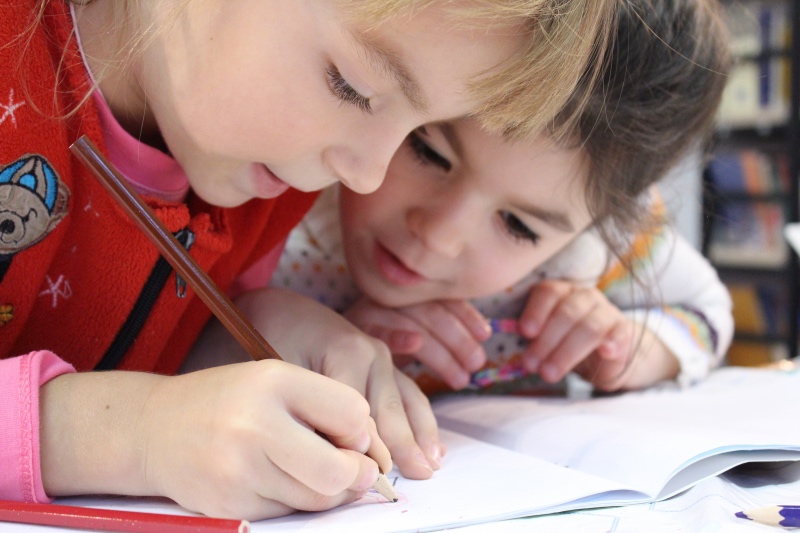
Crocodile tears coursed down her cheeks after the initial wail. Within arm’s length, I quickly gathered her into a hug to pray. Sitting criss-cross applesauce on the floor with my grandchildren gave me a front row seat to the accident. Watching it happen, but unable to prevent it was a bit distressing.
Stepping backwards off the play house he’d been climbing, little brother Eli’s hand pulled back and slammed into Audrey’s head with the wooden toy he was clutching. Unfortunately she thought it was on purpose. Eli having no clue what happened, resumed his play without skipping a beat. Interrupting his play to enter into conflict resolution wasn’t something he was eager to do.
Calmly I asked Eli to look at his sister’s face. “Do you know why Audrey is crying? When you stepped off the house your hand came back and you hit her with the toy you’re holding. Can you think of something you could say to help Audrey feel better?”
He stared back at me blankly.
“If I hurt someone by accident I would say, ‘I’m sorry I hurt you. I didn’t mean to. Would you forgive me?’ Let’s practice.”

As I modeled the words for him, Eli echoed them slowly. I continued holding Audrey in my arms until the tears subsided. I wondered how much Eli understood. I didn’t expect him to necessarily be sorry; after all he was oblivious to his offense. I did hope that modeling the way to handle a conflict would begin to build empathy, while giving him a strategy for the inevitable next conflict.
I didn’t have to wait long to see if our lesson in forgiveness was effective.
Hearing another gut-wrenching cry, I walked into the room where they were playing. It was Audrey, again. Eli had jumped off the couch knocking his sister into the wall. I stepped forward to intervene, but then I saw Eli lean in close to his crying sister, and I stopped. “I’m sorry. Forgive me?” Her tears slowed and they resumed their play.
Sometimes it’s hard to tell the difference between a purposeful hurt and accidental hurt; they’re both painful. Navigating the sphere of conflict resolution can feel overwhelming when tempers flare and ego-centric children are involved. The Bible says, “If it is possible, as far as it depends on you, live at peace with everyone.” Romans 12:18
Peace making doesn’t come naturally to children; it’s a skill that needs to be taught and practiced, and then practiced some more.

Here are 8 ways to help your children learn what it means to Live At Peace With Everyone.
- Ask open ended questions. “What’s happening?” is much less threatening than “Why did you do that?”
- Teach your children to wait their turn to share their side of the story. Listening when others talk shows respect and can build assurance that you will listen when they talk.
- Model the appropriate response and pray for them to build empathy and compassion. You cannot force a child to be sorry; making them say it isn’t always an honest response.
- Give your children time to cool down if needed before talking or responding.
- Pray with them. Ask God to help them love their siblings and friends, and to forgive when they are wronged.
- Help your child find a way to make restitution for the hurt or offense they caused; or a way to bless the child who hurt and offended them to avoid becoming bitter or holding a grudge. (Romans 12:14, 19-20)
- Admit when you’re wrong. Ask for their forgiveness when appropriate. (Matthew 5:23)
- Learn Luke 6:31 together “Do to others as you would have them do to you.” before the next conflict arises. Give your child an opportunity to gain a heart of wisdom by memorizing and applying God’s Word to real life situations.
The Bible has a lot to say about how believers are to act. The Message paraphrases James 3:17-18 this way: “Real wisdom, God’s wisdom, begins with a holy life and is characterized by getting along with others. It is gentle and reasonable, overflowing with mercy and blessings…enjoy its results only if you do the hard work of getting along with each other, treating each other with dignity and honor.”
“Peacemakers who sow in peace reap a harvest of righteousness.” James 3:18 (NIV) Resolving conflict is important, but sowing peace takes it one step further. Jesus said, “Blessed are the peacemakers, for they will be called children of God.” Matthew 5:9 (NIV) It takes prayer, intentional modeling and instruction to encourage children to be peace makers. Your efforts will be worth it; the reward is a harvest of righteousness.



Add a Comment